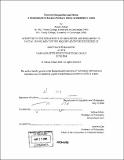| dc.contributor.advisor | Joshua Cohen. | en_US |
| dc.contributor.author | Sofaer, Neema, 1972- | en_US |
| dc.contributor.other | Massachusetts Institute of Technology. Dept. of Linguistics and Philosophy. | en_US |
| dc.date.accessioned | 2005-09-27T17:16:30Z | |
| dc.date.available | 2005-09-27T17:16:30Z | |
| dc.date.copyright | 2004 | en_US |
| dc.date.issued | 2004 | en_US |
| dc.identifier.uri | http://hdl.handle.net/1721.1/28605 | |
| dc.description | Thesis (Ph. D.)--Massachusetts Institute of Technology, Dept. of Linguistics and Philosophy, 2004. | en_US |
| dc.description | Includes bibliographical references (p. 193-196). | en_US |
| dc.description.abstract | This dissertation proposes a new reading and appraisal of an important theory of distributive justice, Ronald Dworkin's "Equality of Resources" (ER). ER is traditional in holding that choices made by rational, ignorant and purely self-interested beings are relevant to distributive justice. ER is novel both in its use of such choices and in incorporating the (previously exclusively conservative) idea that one's success is largely one's own responsibility into liberal egalitarianism. I argue that the tax-and-redistribution scheme Dworkin proposes to make actual distributions just is flawed because he misconceives the role of choice. He errs in thinking that the conditions for person X to receive compensation depend on the choices of such beings, although he is right, I argue, insofar as the relevant choices include X's hypothetical choices. (Further, Dworkin's critics err in thinking, that, according to him, these conditions wholly depend on X's actual choices.) Dworkin errs in that ER implies that whether X meets these conditions can depend on X's irrational choices, although he is right that whether X meets these conditions can depend on some of X's actual choices. ER becomes flawed, I argue, when Dworkin derives a tax-and-redistribution scheme designed to achieve distributive justice in reality from the auction he proposes for making hypothetical distributions just. I then consider whether ER withstands stock objections and how plausible it is relative to rival Theories. Dworkin argues that ER, but not Rawls' Theory, meets the following condition for a Theory to be plausible: the distributions a Theory deems just must be sensitive to choices. I argue that Dworkin's argument is no longer plausible once we realize to which choice sensitivity principle | en_US |
| dc.description.abstract | (cont.) he is himself committed. However, I argue, Seana Shiffrin's objection to ER fails because she misunderstands the role of choice in ER, although she is right insofar as there is a related, though superficial, objection. I also argue that ER is inconsistent and show how to resolve this inconsistency without leaving ER vulnerable to attack by G.A. Cohen's rival Theory. I trace ER's inconsistency and the failure of Dworkin's argument against Rawls' Theory to Dworkin's method of justification. | en_US |
| dc.description.statementofresponsibility | by Neema Sofaer | en_US |
| dc.format.extent | 196 p. | en_US |
| dc.format.extent | 10213193 bytes | |
| dc.format.extent | 10240381 bytes | |
| dc.format.mimetype | application/pdf | |
| dc.format.mimetype | application/pdf | |
| dc.language.iso | en_US | |
| dc.publisher | Massachusetts Institute of Technology | en_US |
| dc.rights | M.I.T. theses are protected by copyright. They may be viewed from this source for any purpose, but reproduction or distribution in any format is prohibited without written permission. See provided URL for inquiries about permission. | en_US |
| dc.rights.uri | http://dspace.mit.edu/handle/1721.1/7582 | |
| dc.subject | Linguistics and Philosophy. | en_US |
| dc.title | Economic inequalities and choice : a reassessment of Ronald Dworkin's theory of distributive justice | en_US |
| dc.type | Thesis | en_US |
| dc.description.degree | Ph.D. | en_US |
| dc.contributor.department | Massachusetts Institute of Technology. Department of Linguistics and Philosophy | |
| dc.identifier.oclc | 57518879 | en_US |
